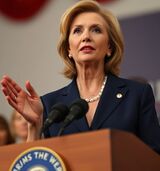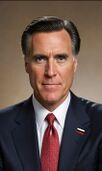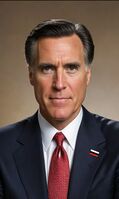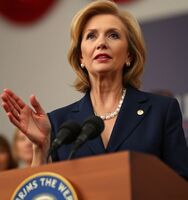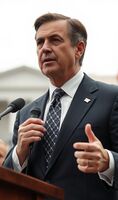Floria presidential election, 1738
270 members of the Electoral College 136 electoral college votes needed to win | ||||||||||||||||
|---|---|---|---|---|---|---|---|---|---|---|---|---|---|---|---|---|
| Turnout | % | |||||||||||||||
|
| ||||||||||||||||
| ||||||||||||||||
Background
Procedure
The Constitution of Floria states that for a person to serve as president, the individual must be a natural-born citizen of the Confederate States, be at least 35 years of age, and have been a Florian resident for at least 14 years. It is forbidden for any person to be elected president more than twice. Major party candidates seek the nomination through a series of primary elections that select the delegates who choose the candidate at the party's national convention. Each party's national convention chooses a vice presidential running mate to form that party's ticket. The nominee for president usually picks the running mate, who is then ratified by the delegates at the party's convention. If no candidate wins a majority of their party's delegates' votes, or (in this election) a party's presumptive nominee drops out of the race between the primaries and the convention, a brokered convention may be held: the delegates are then "released" and are free to switch their allegiance to a different candidate.
The election is an indirect election, in which voters cast ballots for a slate of members of the Electoral College; these electors then directly elect the president and vice president. The number of electoral votes has been reduced from 530 to 270 compared to previous elections.
Nominations
UPR
Nominee
| 1738 ticket | |||||||||||||||||||||||||||
| Michael Hutchinson | Ronald Trueman Jr. | ||||||||||||||||||||||||||
|---|---|---|---|---|---|---|---|---|---|---|---|---|---|---|---|---|---|---|---|---|---|---|---|---|---|---|---|
| for President | for Vice President | ||||||||||||||||||||||||||
| President of Floria | Vice President of Floria | ||||||||||||||||||||||||||
SDP
Nominee
| 1738 ticket | |||||||||||||||||||||||||||
| Rachael Adams | Kingsley Graham | ||||||||||||||||||||||||||
|---|---|---|---|---|---|---|---|---|---|---|---|---|---|---|---|---|---|---|---|---|---|---|---|---|---|---|---|
| for President | for Vice President | ||||||||||||||||||||||||||
| Former Senator for Kingsland and businesswoman | Former Secretary of State | ||||||||||||||||||||||||||
Campaign issues
Adams campaign
Hutchinson campaign
Economy
The Recession of 1737, a year before the election, affected multiple nations across Micras, mostly involving Floria's allies. The results of the recession remain unclear in Floria; however, it is expected that Floria will have a slight dip in trade with Raspur Pact allies.
Plans from both candidates have yet to come to fruition.
Abortion
Abortion laws are controversial in Floria. The Church of Floria strictly bans abortion as a standalone right but permits it in exceptional cases. Abortion by request has been illegal since 1728 and Social Democrats have campaigned to reintroduce that right. United Republicans will continue to restrict its legality.
Border security and immigration
Border security and immigration have become among the top issues concerning potential voters in the election. Polling has shown that most Florians want to reduce immigration and that a substantial minority of white United Republicans are concerned about the demographic decline of native Florians. A surge of migrants entering neighbouring countries through the border has occurred. Illegal crossings reached an all-time high in 1736 with both candidates concerned about the country's border security both announcing plans to cut down or eliminate illegal immigration.
Gun laws
Democracy
Polling before the election has indicated dissatisfaction with the state of Florian democracy. Democrats tend to believe that United Republicans are threatening the country with Christian nationalist autocratic tendencies and their attempts to strictly follow the laws of the Church of Floria. Michel Huthinson's 1738 presidential campaign has been criticized by legal experts, historians, and political scientists for making increasingly violent and authoritarian statements after his plans for 24-year terms were denied, which some believe the Hutchinson campaign is intentionally trying to establish. Hutchinson's platform calls for the vast expansion of presidential powers and the executive branch over every part of the federal government. Hutchinson has said his political opponents are a greater threat to Floria than other countries and terrorist organisations and has urged deploying the military on Florian soil to fight "the enemy from within". Hutchinson and the Republicans have repeatedly voiced support for outlawing political dissent and criticism which the party considers misleading. Hutchinson has infamously tried prosecuting his political rivals and would have fewer checks on his power in a second term.
Hutchinson's campaign has been noted for using an increasingly violent rhetoric against his political opponents.
Education
Hutchinson has pledged to terminate the Department of Education and replace the control of education at the state level. Adam proposed that teachers under her administration would gain a significant payrise.
LGBTQ rights
Since the last election, there has been a significant push for LGBTQ+ rights, with the focus mostly on policies affecting transgender individuals and the use of IVF for lesbian couples.
Rachael Adams has affirmed support for LGBTQ+ rights and criticised legislation for being "outdated compared to the rest of the planet" and Floria should work towards improving its human rights.
Hutchinson has outlined plans to modify current policies regarding transgender individuals if elected. His proposed policies include facility access and pronoun usage for transgender students being rescinded establishing federal recognition of binary gender categories, and restricting certain surgical procedures and hormone therapies for children. Hutchinson has stood by not changing other LGBT+ rights stating that the Church of Floria must be respected and that citizens must follow its rules.
